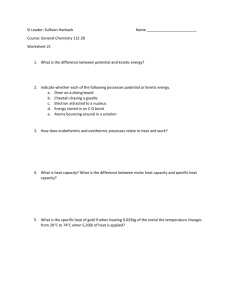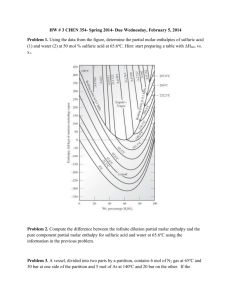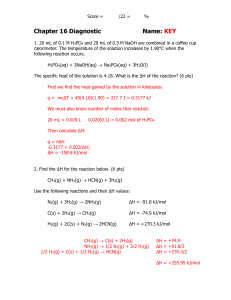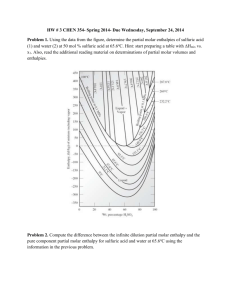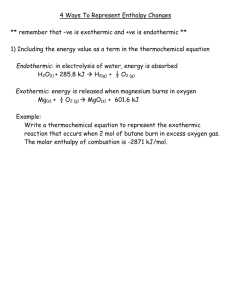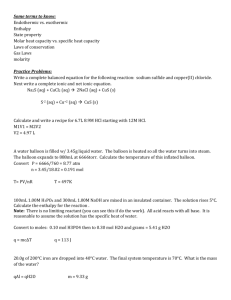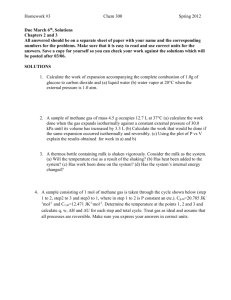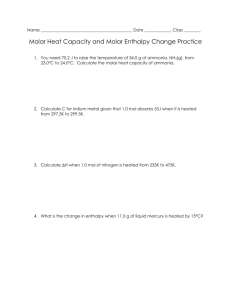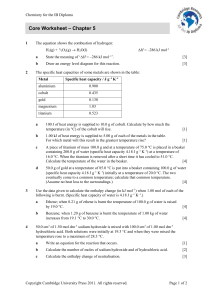Bond Enthalpies - Support Materials
advertisement
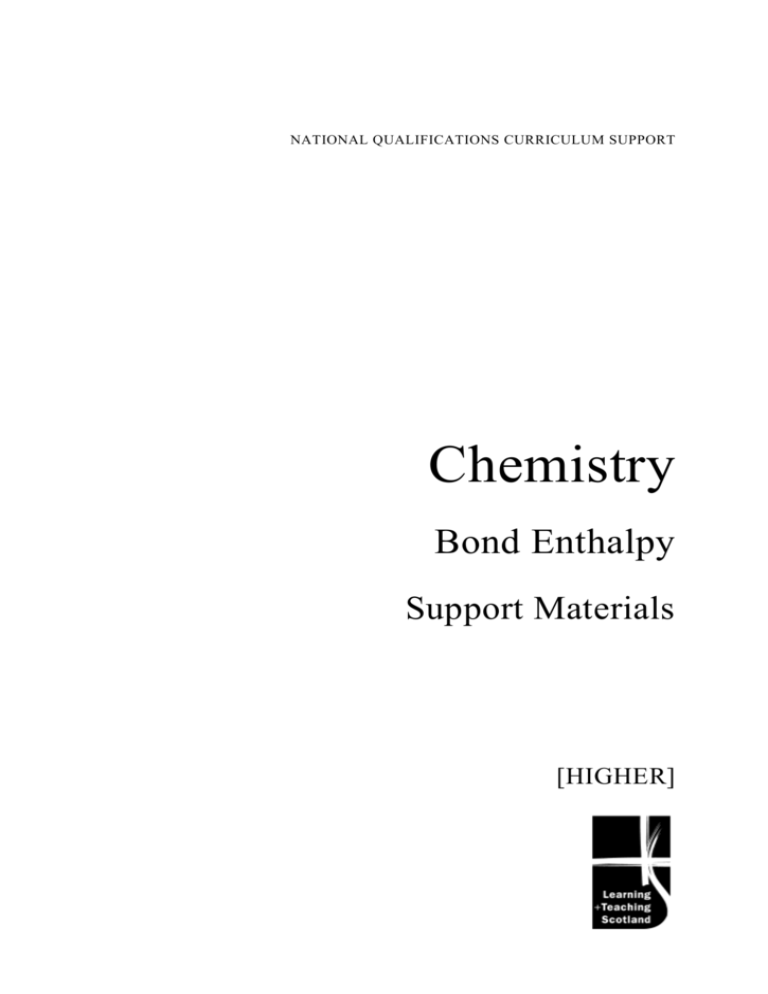
NATIONAL QUALIFICATIONS CURRICULUM SUPPORT Chemistry Bond Enthalpy Support Materials [HIGHER] The Scottish Qualifications Authority regularly reviews the arrangements for National Qualifications. Users of all NQ support materia ls, whether published by Learning and Teaching Scotland or others, are reminded that it is their responsibility to check that the support materials correspond to the requirements of the current arrangements. Acknowledgement Learning and Teaching Scotland gratefully acknowledges this contribution to the National Qualifications support programme for Chemistry. The publisher gratefully acknowledges permission to use a cartoon image from http://www.featurepics.com/online/Cartoon -Karate-Girl-illustrations370287.aspx © Nueyer © Learning and Teaching Scotland 2011 This resource may be reproduced in whole or in part for educational purposes by educational establishments in Scotland provided that no profit accrues at any stage. 2 BOND ENTHALPY (H, CHEMISTRY) © Learning and Teaching Scotland 2011 Contents Questions 4 Solutions 6 BOND ENTHALPY (H, CHEMISTRY) © Learning and Teaching Scotland 2011 3 QUESTIONS Bond Enthalpy Questions 1. Using bond enthalpies, calculate the enthalpy change for the combustion of hydrogen to produce water shown by the equation below. 2H 2 (g) + O 2 (g) 2. Use bond enthalpy values from the data book to calculate the enthalpy change for the following reaction. CH 4 (g) + Br 2 (g) 3. C 4 H 10 (g) Using bond enthalpy values, calculate the enthalpy change for the addition reaction between iodine and propene. C 3 H 6 (g) + I 2 (g) 4 C 2 H 5 Br (g) Use the bond enthalpy values quoted in the data book to calculate the enthalpy change for the hydrogenation of but-1-ene. C 4 H 8 (g) + H 2 (g) 6. CO 2 (g) + 2H 2 O (g) Using bond enthalpy values, calculate the enthalpy change for the following addition reaction. C 2 H 4 (g) + HBr (g) 5. CH 3 Br (g) + HBr (g) The data book gives the enthalpy of combustion of methane as –891kJ mol –1 . Use bond enthalpies to calculate the enthalpy change for this reaction. CH 4 (g) + 2O 2 (g) 4. 2H 2 O (g) BOND ENTHALPY (H, CHEMISTRY) © Learning and Teaching Scotland 2011 C 3 H 6 I2 (g) QUESTIONS 7. Hydrogen chloride can react with ethyne in a two-stage addition process to give a saturated product. Calculate the enthalpy change for this reaction using bond enthalpy values from the data book. C 2 H 2 (g) + 2HCl (g) 8. The data book gives the enthalpy of combustion of ethanol as –1367 kJ mol –1 . Use bond enthalpies to calculate the enthalpy change for this reaction. C 2 H 5 OH (g) + 3O 2 (g) 9. 2CO 2 (g) + 3H 2 O (g) Calculate the enthalpy of formation for ethene using the enthalpy of sublimation and bond enthalpy values from the data book. 2C (s) + 2H 2 (g) 10. C 2 H 4 Cl 2 (g) C 2 H 4 (g) The data book quotes the mean bond enthalpy for a carbon-to-carbon double bond (C=C) as 602 kJ mol –1 . Use the enthalpy of formation given and bond enthalpies from the data book to calculate the enthalpy of the C=C bond in ethene. 2C (s) + 2H 2 (g) C 2 H 4 (g) ∆H formation = 52 kJ mol –1 BOND ENTHALPY (H, CHEMISTRY) © Learning and Teaching Scotland 2011 5 SOLUTIONS Solutions 1. Using bond enthalpies, calculate the enthalpy change for the combustion of hydrogen to produce water shown by the equation below. 2H 2 (g) + O 2 (g) H H H H + 2H 2 O (g) O O Bond breaking 2 mol H–H = 2 × 432 = 864 1 mol O=O = 497 Bond making 4 mol H–O = 4 × 458 = 1832 Total energy put in = +1361 kJ Total energy given out = –1832 kJ ∆H = 1361 – 1832 = –471 kJ mol–1 2. Use bond enthalpy values from the data book to calculate the enthalpy change for the following reaction. CH 4 (g) + Br 2 (g) CH 3 Br (g) + HBr (g) H H C H H + Br Br H H Br + H Bond breaking 4 mol C–H = 4 × 414 = 1656 1 mol Br–Br = 194 Bond making 3 mol C–H = 3 × 414 = 1242 1 mol C–Br = 285 1mol H–Br = 362 Total energy put in = +1850 kJ Total energy given out = –1889 kJ ∆H = 1850 – 1889 = –39 kJ mol–1 6 C BOND ENTHALPY (H, CHEMISTRY) © Learning and Teaching Scotland 2011 H Br SOLUTIONS 3. The data book gives the enthalpy of combustion of methane as –891kJ mol –1 . Use bond enthalpies to calculate the enthalpy change for this reaction. CH 4 (g) + 2O 2 (g) CO 2 (g) + 2H 2 O (g) O H H C O O O O H + H O C O + H O H H Bond breaking 4 mol C–H = 4 × 414 = 1656 2 mol O=O = 2 × 497 = 994 Bond making 2 mol C=O = 2 × 798 = 1596 4 mol H–O = 4 × 458 = 1832 Total energy put in = +2650 kJ Total energy given out = –3428 kJ H ∆H = 2650 – 3428 = –778 kJ mol–1 4. Using bond enthalpy values, calculate the enthalpy change for the following addition reaction. C 2 H 4 (g) + HBr (g) H H C H C 2 H 5 Br (g) C H + H Br H H Br C C H H H Bond breaking 1 mol C=C = 602 4 mol C–H = 4 × 414 = 1656 1 mol H–Br = 362 Bond making 1 mol C–C = 346 5 mol C–H = 5 × 414 = 2070 1 mol C–Br = 285 Total energy put in = +2620 kJ Total energy given out = –2701 kJ ∆H = 2620 – 2701 = –81 kJ mol–1 BOND ENTHALPY (H, CHEMISTRY) © Learning and Teaching Scotland 2011 7 SOLUTIONS 5. Use the bond enthalpy values quoted in the data book to calculate the enthalpy change for the hydrogenation of but -1-ene. C 4 H 8 (g) + H 2 (g) H C H H H C C C H H H C 4 H 10 (g) H + H H H H H H H C C C C H H H H Bond breaking 1 mol C=C = 602 2 mol C–C = 2 × 346 = 692 1 mol H–H = 432 8 mol C–H = 8 × 414 = 3312 Bond making 3 mol C–C = 3 × 346 = 1038 10 mol C–H = 10 × 414 = 4140 Total energy put in = +5038 kJ Total energy given out = –5178 kJ ∆H = 5038 – 5178 = –140 kJ mol–1 6. Using bond enthalpy values, calculate the enthalpy change for the addition reaction between iodine and propene. C 3 H 6 (g) + I 2 (g) H C H H H C C + H C 3 H 6 I2 (g) I I H I H C C C H H H Bond breaking 1 mol C=C = 602 1 mol C–C = 346 6 mol C–H = 6 × 414 = 2484 1 mol I–I = 149 Bond making 2 mol C–C = 2 × 346 = 692 6 mol C–H = 6 × 414 = 2484 2 mol C–I = 2 × 213 = 426 Total energy put in = +3581 kJ Total energy given out = –3602 kJ ∆H = 3581 – 3602 = –21 kJ mol–1 8 H I BOND ENTHALPY (H, CHEMISTRY) © Learning and Teaching Scotland 2011 H H SOLUTIONS 7. Hydrogen chloride can react with ethyne in a two-stage addition process to give a saturated product. Calculate the enthalpy change for this reaction using bond enthalpy values from the data book. C 2 H 2 (g) + 2HCl (g) H C C H C 2 H 4 Cl 2 (g) H Cl H Cl H + C l C Cl H H C H Bond breaking 1 mol CC = 835 2 mol C–H = 2 × 414 = 828 2 mol H–Cl = 2 × 428 = 856 Bond making 1 mol C–C = 346 4 mol C–H = 4 × 414 = 1656 2 mol C–Cl = 2 × 326 = 652 Total energy put in = +2519 kJ Total energy given out = –2654 kJ ∆H = 2519 – 2654 = –135 kJ mol–1 BOND ENTHALPY (H, CHEMISTRY) © Learning and Teaching Scotland 2011 9 SOLUTIONS 8. The data book gives the enthalpy of combustion of ethanol as –1367 kJ mol –1 . Use bond enthalpies to calculate the enthalpy change for this reaction. C 2 H 5 OH (g) + 3O 2 (g) H H C H O H C H 2CO 2 (g) + 3H 2 O (g) O + O H O O O O O C H O + O C O Bond breaking 1 mol C–C = 346 5 mol C–H = 5 × 414 = 2070 1 mol C–O = 358 1 mol H–O = 458 3 mol O=O = 3 × 497 = 1491 Bond making 4 mol C=O = 4 × 798 = 3192 6 mol H–O = 6 × 458 = 2748 Total energy put in = +4723 kJ Total energy given out = –5940 kJ BOND ENTHALPY (H, CHEMISTRY) © Learning and Teaching Scotland 2011 H H ∆H = 4723 – 5940 = –1217 kJ mol–1 10 O O O H H H SOLUTIONS 9. Calculate the enthalpy of formation for ethene using the enthalpy of sublimation and bond enthalpy values from the data book. 2C (s) + 2H 2 (g) C (s) H H H H C 2 H 4 (g) + C (s) H H C C H H Bond breaking 2 mol C (s) C (g) = 2 × 715 = 1430 2 mol H–H = 2 × 432 = 864 Bond making 1 mol C=C = 602 4 mol C–H = 4 × 414 = 1656 Total energy put in = +2294 kJ Total energy given out = –2258 kJ ∆H = 2294 – 2258 = + 36 kJ mol–1 10. The data book quotes the mean bond enthalpy for a carbon-to-carbon double bond (C=C) as 602 kJ mol –1 . Use the enthalpy of formation given and bond enthalpies from the data book to calculate the enthalpy of the C=C bond in ethene. 2C (s) + 2H 2 (g) C (s) C 2 H 4 (g) H H H H ∆H formation = 52 kJ mol –1 + C (s) H H C C H H Bond breaking Bond making 2 mol C (s) C (g) = 2 × 715 = 1430 1 mol C=C = x 2 mol H–H = 2 × 432 = 864 4 mol C–H = 4 × 414 = 1656 Total energy put in = +2294 kJ ∆Hformation 52 x Total energy given out = –(1656 + x) kJ = 52 = 2294 – (1656 + x) = 2294 – 1656 – x = 2294 – 1656 – 52 = + 586 kJ mol–1 BOND ENTHALPY (H, CHEMISTRY) © Learning and Teaching Scotland 2011 11
